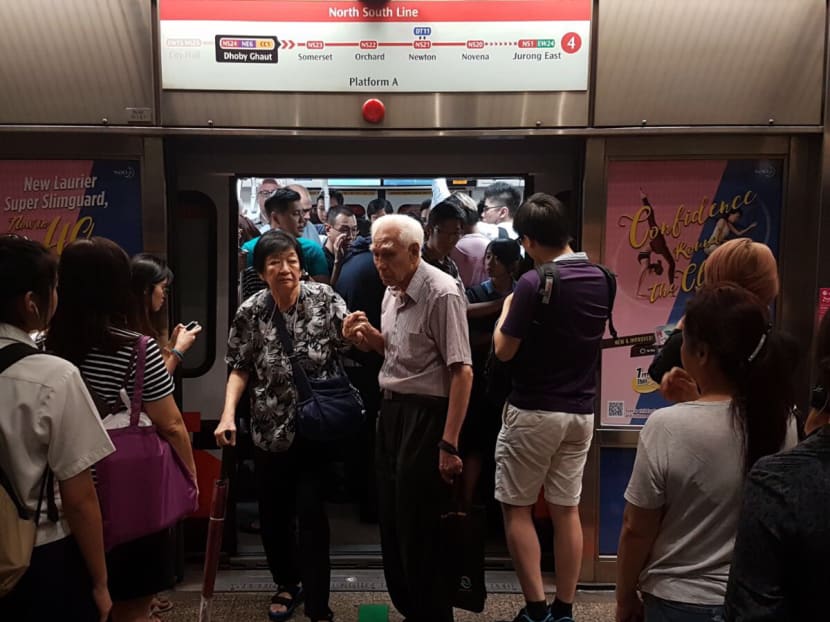NSL, Tuas West Extension hit by train delays at rush hour
SINGAPORE — Signalling faults wreaked havoc on commuters' travelling plans during Wednesday's (June 28) evening peak hour rush, affecting train services on the North-South Line and East-West Line.
SINGAPORE — Signalling faults on the North-South Line (NSL) and the newly opened Tuas West Extension during the evening peak-hour on Wednesday (June 28) led to train delays for more than two hours, upsetting commuters caught in the disruptions.
The hold-up on the NSL, which saw long queues at several stations, is linked to a new signalling system that requires full-day tests before it stabilises. This is just a day after the Land Transport Authority (LTA) and SMRT said that the trials might take "a few more months", and commuters may continue to experience some delay when travelling on the NSL "if new issues emerge".
On Wednesday, rail operator SMRT first tweeted at about 5.15pm that train services on the NSL would be delayed for about half an hour due to a signalling fault.
Train services were later confirmed to be down on the entire line at 5.35pm, and free bus services were activated to accommodate the crowds.
Separately, at about 5.20pm, there were similar disruptions due to a signalling fault that crippled train services along the four new Tuas West Extension stations, which opened on June 18 - Tuas Link, Tuas West Road, Tuas Crescent and Gul Circle - as well as Joo Koon station on the East-West Line.
Train services later resumed progressively, starting from about 5.45pm onwards. Those on Tuas West Extension were back to normal at about 6pm.
Those running on the NSL between Jurong East and Marina South Pier picked up again at 6.10pm, albeit with 15-minute delays.
It took another hour, close to 7.20pm, before trains were fully running on the NSL and the free bus services were stopped.
In a joint statement by LTA and SMRT on their Facebook pages, the disruptions on both networks were caused by a signalling fault on the new communication-based train control (CBTC) system. They said initial investigations pointed to "failure in the radio communication network" of the new system, which is undergoing intensive full-day testing.
"Unlike new lines where the signalling system can be fully tested before being put into commuter service, we have to continue full-day checks on the existing NSL even as service is ongoing." They did not elaborate on how the new system affected the Tuas West Extension.
Even though free bus services were available, both parties noted that passengers might have experienced longer waiting times due to train arrivals bunching. "We apologise for the inconvenience caused," they said, adding that the NSL signalling system is expected to take a few more months to fully stabilise.
In central Singapore from 6.40pm to 7.10pm, queues waiting for train arrivals were orderly, with Jurong-East-bound trains arriving at 10-minute intervals or so at Dhoby Ghaut MRT Station. Raffles Place MRT Station, however, was significantly more crowded from 7.15pm to 7.40pm. While trains arrived at regular one- to two-minute intervals, they were mostly packed, with just five commuters being able to board each time.
Retiree Mohammad Hamid, 66, who was at Dhoby Ghaut station at 6.40pm, saw no trains in sight after a 15-minute wait.
"I need to pick my grandson up ... I'm already 10 minutes late," he said.
Undergraduate Xiao Ying, 23, gave up waiting at the same station after two trains came and went in a span of 20 minutes, saying they were "packed like sardines".
"People behind (me in the queue) were just rushing forward to enter the train, so I couldn't go in at all," she said. "I'm going to take a cab instead."
In the heartlands at Bishan MRT Station, long and winding queues were seen at the platform.
Many resorted to taking buses, but those were also packed. Nur Amalina Mohamed Sani, 17, a junior college student, found it "a little upsetting", saying it was the first time she experienced such a "serious" situation.
ADDITIONAL REPORTING BY ILDYKO ANG










